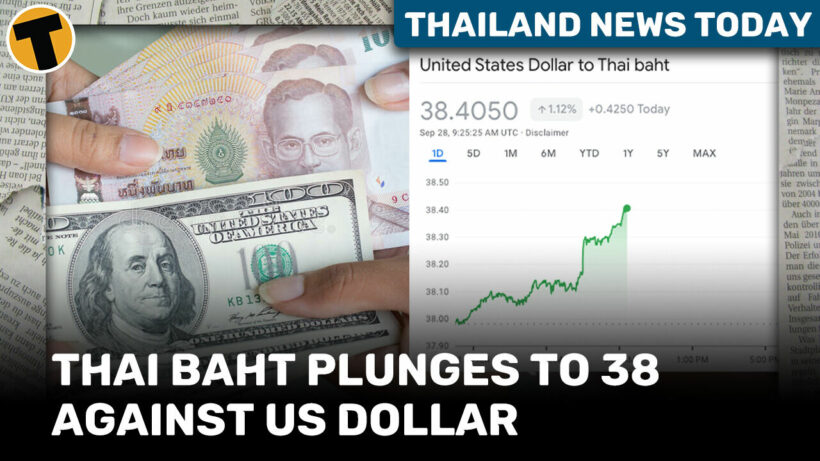Thailand News Today | Thai Baht plunges to 38 against USD for the first time in 16 years

The volatile Thai baht has depreciated to 38 against the US dollar even faster than foreseen by economists. The last time the baht reached 38 to the dollar was 16 years and two months ago on July 26, 2006.
The baht’s depreciation is attributed to the rising strength of the US dollar. The dollar index has risen to 114, causing several currencies worldwide to depreciate. The US dollar continues to grow in value due to continued federal fund hikes.
Amid pressure from high inflation rates and the depreciating baht, Thailand’s Monetary Policy Committee will meet today to discuss raising the policy rate from 0.75% to 1%. The policy rate hike will increase interest rates between Thailand and the US with the goal of temporarily strengthening the baht and “supporting economic recovery.”
Though there might be a silver lining to Thailand’s weakening baht for the tourism industry. The president of the Thai Hotels Association (THA) says the weakening baht is one of several factors making Thai tourism more attractive in post-pandemic times.
THA president Marissa Nunbhakdi says that now the ‘Test & Go’ and ‘Thailand Pass’ schemes have been scrapped, momentum has built up for reopening borders. She said the weak baht could help the tourism industry since tourists can spend more money in Thailand now.
Marissa noted, however, that she is not sure whether the weak baht will help offset high transportation costs. She said the spike in airfares has impacted the number of foreign tourists flying to the kingdom. Marissa said this market has remained lower than expected during the past few months.
According to the Thai government, more than five million foreign tourists arrived in the ‘Land of Smiles’ between January 1 and September 8. The total number of foreign visitors was 5,018,172, said spokesman Thanakorn Wangboonkongchana.
The Tourism Authority of Thailand estimated that the number of tourists would reach 10 million, based on advanced flights and hotel bookings for the next three months.
———-
Hibiocy announced the release of their anti-Covid nasal spray, set to hit the shelves on October 1. The spray is a homegrown invention, developed in Thailand by medical researchers at the faculty of medicine at Chulalongkorn University. The design blocks Covid from entering the body through the nose.
The company producing it is a subsidiary of Rojukiss International, and its CEO made the announcement yesterday that the nasal spray would be commercially available from Saturday. Like most Covid drugs, the creators named it something catchy. The spray will be sold under the brand name “VAILL CITITRAP Anti-Cov Nasal Spray.”
In Thailand, a team of doctors and researchers at the university developed the nasal spray for domestic use. Hopefully, the spray can be a pre-emptive safety against coronavirus infections. We’ll see if it gives people the confidence to remove their masks.
The nasal spray works by coating the inside of your noses, blocking the Covid virus from being absorbed into the body through the nasal cavity. Using the spray in doses every six hours or three times per day should protect users from the virus.
The director of the Health System Research Institute hailed the Thai creation as innovative. Hibiocy has now registered patent rights for the nasal spray as well. It is now ready for commercial distribution and sales.
——-
Thailand is extending the legal limit of abortion from 12 to 20 weeks. The new law will come into effect 30 days after its announcement by the Ministry of Public Health in the Royal Gazette, which was published yesterday, September 26.
The new law stipulates that pregnant women in Thailand may legally abort a pregnancy up to 20 weeks so long as they seek a doctor’s consultation first. The doctor will provide the woman with all the information to help them come to a decision themselves before legally approving the abortion.
In January last year, Thailand’s Parliament voted to legalise abortion in the first trimester (up to 12 weeks). However, criminal penalties remained in place for women who aborted pregnancies over 12 weeks and did not meet the criteria set by the country’s Medical Council.
Similarly, any person or clinic found to provide abortions after the 12-week limit would face fines and imprisonment.
The criminal penalties remain will remain in place for abortions of pregnancies over 20 weeks.
———-
Police and residents in Chiang Mai urged an American man to stop riding his yellow go-kart on a public road after highlighting the danger he poses to himself and others.
A dash cam video of the yellow single-seat go-kart was uploaded to Thai social media on September 21. The kart is seen dashing down the left lane of the Klong Chonlapratarn Road, or Canal Road, in the Hang Dong district of Chiang Mai.
Most residents agree the kart is too small, too low, and not easy to see for other vehicles on the road.
The kart belongs to an American man who lives in the district. It does not have an engine and it is operated like a bicycle. The rider has to climb inside, lean back and peddle to get it moving.
The yellow kart was involved in an accident with a pickup truck in 2018 on Mahidon Road in Chaing Mai. There were no injuries or losses reported from the accident but residents don’t want him to use the kart again.
Hang Dong Police Station acknowledged Chiang Mai locals have reported the man several times because of the danger he poses to everyone.
Police said the foreigner did stop using the kart after he had been warned but would then start using it again.
The foreigner said…
“My car doesn’t break any Thai laws. It doesn’t have an engine.”
The police, however, underlined that the cart is illegal according to the Land Traffic Act because it could cause danger to others on the road. The police added that they would warn the foreigner about the kart again.
According to Section 6 of the Land Traffic Act, people must not use vehicles that are in an unstable condition, or vehicles that can cause danger or affect others’ lives. Anyone who fails to follow the law will be fined up to 500 baht.
———
Organisers of the annual Naga Fireball Festival are hoping the gala will once again recapture the imagination of all visitors after a couple of barren Covid-19 pandemic years.
The festival is back in the Isaan province of Nong Khai on October 10 and promotors are predicting a bonanza event that will help boost the provincial economy by up to 80%.
President of the Nongkhai Chamber of Commerce, Sasritphon Wichitwong, promises the best Naga Fireball Festival yet and believes it will recapture the imagination of residents and tourists alike.
The festival takes place at the end of the Buddhist Lent on October 10.
The Naga Fireball Festival, or Bang Fai Phaya Nak in Thai, celebrates the mythical Phaya Nak, a giant serpent which they believe lives in the Mekon River.
Crowds gather and sit along 250 kilometres of the Mekhon River bank in Nong Khai and Bueng Kan provinces to see the fireballs rise from the river at night. The glowing balls in different sizes rise in the air to about 150 metres and then disappear.
Locals believe that the fireballs are released by the giant serpent living in the Mekong River. It’s like the local version of Santa Claus.
Aside from observing the rising fireballs, the festival will feature merit-making ceremonies, artistic performances, boat competitions, Thai boxing, and a walking street full of street food shops.
Latest Thailand News
Follow The Thaiger on Google News:


























